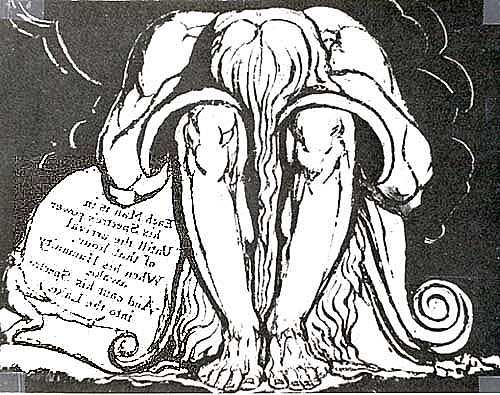ENGLISH 400 (#63664) & 425 (#83910)
English Romanticism & Critical Traditions:
Blake in Context
Fall 2001
“Every thing possible to be believ’d is an image of truth.”
William Blake, The Marriage of Heaven and Hell
plate 37, Jerusalem
Relevant Instructor Information
Instructor: Mark Lussier
Office: L&L 547C
Phone: 480.965.3925
E-Mail: mark.lussier@asu.edu
Home Page: www.public.asu.edu/~idmsl
Class Hours: Tuesday & Thursday, 10:40 – 11:55 AM
Class Room: ED 232
Office Hours: Tuesday & Thursday, 1:00 – 3:00 PM, Wednesday, 1:00 - 3:00[1]
Course Description
This course has a two-fold purpose in keeping with its cross-listed status: 1) to introduce English majors to the history of critical theory (English 400), and 2) to apply theoretical constructions emerging from this history to “read” the work of the “first” English Romantic artist William Blake (English 425). The organization of the course will be somewhat bifurcated; the first half of the course will focus on critical texts found in David H. Richter’s The Critical Tradition (with Blake poems intruding in a limited fashion), and the second half of the course will focus on Blake’s work found in David V. Erdman’s The Complete Poetry and Prose of William Blake (with contemporary critical theory intruding in limited fashion). Blake work offers an interesting opportunity for such applications, since his works (both poetic and artistic) participate in critical concerns that trace their ontology back to the Hebraic and Hellenic traditions yet his works have also become sites for the application of newer critical paradigms associated with structuralism, post-structuralism, and postmodernism.
Textbooks
David Richter, ed. The Critical Tradition: Classic Texts & Contemporary Trends (abbreviated as CT)
David V. Erdman, ed. The Complete Poetry & Prose of William Blake (abbreviated as WB)
Governing Conventions
You must complete all work for the class to receive a final grade.
I do not accept late papers, and I do not give make-up examinations (unless you can provide documentation for illness or other mitigating circumstances).
You are allowed two absences without explanation, but three unexplained absences will result in a one-letter reduction in final grade.
I expect students to adhere to current university policies governing plagarism and classroom behavior.
Calculating the Final Grade
Mid-semester Examination 20%
Final Examination 20%
Response Papers (E-Mail: 4 x 5%) 20%
Research Paper 30%
Participation 10%
Reading Schedule
August
21 Introduction to the Course
23 "Preface" and Introduction" (CT v-xiii, 1-14); Blake, "Descriptions of the Last Judgment" (552-67)
Classical Traditions
28 Plato, "Republic" and "Ion" (CT 17-37); Blake, "On Homer's Poetry" and "On Virgil" (WB 269-70)
30 Aristotle, "Poetics" (CT 38-64); Blake, letters to Trusler and Cumberland (WB 701-4)
September
3 Labor Day Holiday
4 Horace, "The Art of Poetry" (CT 68-79); Blake, "The Laöcoon" (WB 273-6)
6 Plotinus, "On Intellectual Beauty" and Dante, "Letter to Can Grande della Scala" (CT 68-79, 119-23); Blake, "The Mental Traveller" (WB 483-6) and "Letter of Butts" (WB 720-22)
The English Tradition
11 Sidney, "An Apology for Poetry" (CT 131-59); Blake, "Imitation of Spenser" (WB 420)
13 Sidney (continued), and Pope (CT 206-17); Blake, Poetical Sketches: poems for the seasons (WB 408-10)
18 Hume, ""Of the Standard of Taste" (CT 239-52); Blake, "All Religions Are One" and "There Is No Natural Religion" (WB 1-3)
The Romantic Tradition
20 Kant, From Critique of Judgment (CT 253-80); Blake, "Letters to Butts" (WB 723-5, 728-31)
25 Schiller, From On Naive and Sentiment Poetry (CT 294-99); Blake, The Book of Thel (2-7)
27 Wordsworth, "Preface" to Lyrical Ballads (CT 300-14); Coleridge, From Biographia Literaria (CT 315-9, 321-32); Blake, Songs of Innocence: "Introduction," "The Ecchoing Green," and "The Chimney Sweeper" (WB 7, 8, 10)
October
2 Shelley, A Defense of Poetry (CT 337-57) Blake, Songs of Innocence: "The Divine Image" and "Holy Thursday" (WB 11-3)
4 Hegel, Introduction to the Philosophy of Art (CT 361-72); Blake, Songs of Innocence: "Introduction," "Earth's Answer," and "The Chimney Sweeper" (WB 18, 22);
Blake in Context
9 Blake, The Marriage of Heaven and Hell (WB 33-44); Eliot, Tradition and the Individual Talent (CT 498-503);
11 Blake, The Marriage of Heaven and Hell (continuned); Foucault, "What is an Author" (CT 889-900)
16 Blake, Visions of the Daughters of Albion (WB 45-51); Woolf, all selections (CT 548-60); Cixous, The Laugh of the Medusa (CT 1453-66)
18 Blake, Visions of the Daughters of Albion; Irigaray, This Sex Which Is Not One (CT 1466-72)
23 Blake, "America, A Prophecy" (WB 51-60); Marx, "Consciousness Derived from Material Conditions" (CT 385-92);
25 Blake, "Europe, A Prophecy" (WB 60-7); Benjamin, Work of Art in the Age of Mechanical Reproduction (CT 1105)
30 Blake, The [First] Book of Urizen (WB 70-84); Jameson, From The Political Unconscious (CT 1172-88)
November
1 Blake, Urizen (continued) ; Freud, "Creative Writers and Daydreaming" (CT 481-95)
6 Blake, The Book of Ahania (WB 90-5); Brooks, "Freud's Masterplot" (CT 481-95, 1033-44)
Blake's Epic Impulses
8 Blake, Vala, or The Four Zoas (WB 300-408): Introductory Lecture
13 Blake, Vala, or The Four Zoas: Nights One and Two; Lévi-Strauss, "The Structural Study of Myth" (CT 835-44)
15 Blake, Vala, or The Four Zoas: Nights Three and Four; Derrida, "Structure, Sign, and Play in the Discourses of the Human Sciences" ( CT 877-89)
20 Blake, Vala, or The Four Zoas: Nights Five and Six; Iser, "The Reading Process: A Phenomenological Approach" (CT 955-68)
27 Blake, Vala, or The Four Zoas: Nights Seven, Eight & Nine; Frye, "The Archetypes of Literature" (CT 641-52)
29 Blake, Milton (WB 95-144); Kristeva, "Psychoanalysis and the Polis" (CT 1075-87)
December
4 Blake, Milton (WB 95-144); Barthes, "From Work to Text" (CT 900-05)
7 10:00 – 11:50 AM, Final Examination, Lussier, "Resisting Critical Erasure, or Blake Beyond Postmodernity"
